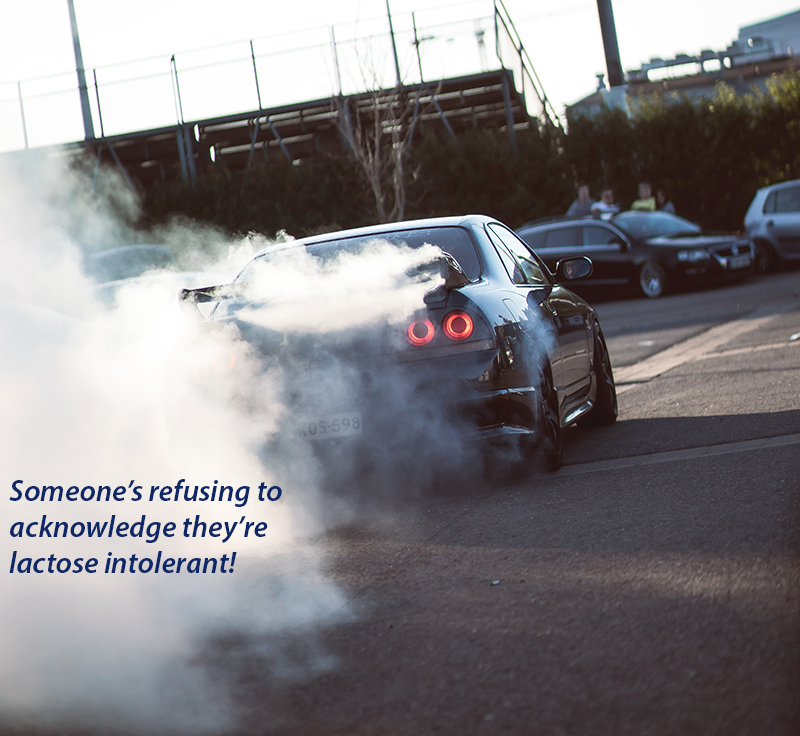A man’s body is like a car: it needs regular maintenance and check-ups to keep it in tip-top shape.
Dom Cadden
The engine
The heart is a four-valve, fuel-injected engine and, just like your car’s engine, you can’t always spot the problem before something blows. You can’t usually see symptoms of hypertension and high cholesterol. Regular service checks are the only way to go. Fortunately, there are many simple lifestyle changes you can make to reduce these problems.
Not smoking is top of the list. Medication can control high blood pressure and cholesterol, but in many cases they can be remedied with diet and exercise. Maintain a healthy weight and ease up on alcohol, as heavy drinking increases the risk of high blood pressure, heart attacks and strokes.
Suspension
Knees are a bloke’s suspension, and once they get creaky, you’ll find your traction is not exactly graceful through curves. The good news is that injuries that would end a sporting career 30 years ago are just a speed hump these days. Much more is understood about how to strengthen the knee joint and realign the patella, and huge advances have been made in surgery. One international study showed that 84 per cent of men who had ACL (anterior cruciate ligament) knee reconstruction continue at a high level of activity 15 years later and have no severe osteoarthritis.
battery
Just like their car battery, men expect their penis to fire up first go every time and hold a full charge until they reach their destination, yet 13 per cent of Australian men will have erection problems in their 40s. The problem is physical 75 per cent of the time and psychological the rest.
One way to rule out a physical cause is to tape your penis to your leg before bed, as men usually have three to five erections during sleep. Don’t ignore the issue as it may indicate problems such as diabetes, high blood pressure, heart or thyroid conditions, poor blood flow, depression, neurological disorders or a reaction to medication. Exercise and avoiding nicotine and alcohol will help. Oral drugs can assist erections, but they won’t enhance them if you are not impotent and they have side effects.
fuel line
The most common stomach problem, dyspepsia, is like something going wrong in a car’s fuel line. There is pain in the upper abdomen or lower chest and sometimes acid reflux, bloating, nausea or vomiting. It is often blamed on food, but is usually the nerves and muscles that control the digestive organs not working properly. Symptoms fluctuate and are provoked by eating.
At worst, dyspepsia can be the sign of a serious problem, such as a deep stomach ulcer or stomach cancer. Anti-inflammatory medicine can make things worse. A doctor may recommend acid-blocking medicine and antibiotics if you have an infection. If the problem persists, an endoscopy (a tiny camera on a tube) might be used to look for damage to the gut.
alternator

Anyone who has ever seen two episodes of House knows that once your liver goes, you’re on the way to the wreckers. Yet Australian men abuse it to the point where liver cirrhosis is their 10th top killer. The problem is clear: 98 per cent of the alcohol you drink is metabolized by the liver. Drink an average of four standard drinks a day for more than a decade and there’s a 15 per cent chance you will have cirrhosis.
Doctors feel for an enlarged liver by pushing on your abdomen. If cirrhosis is suspected, blood tests, ultrasounds or biopsies are carried out to confirm the diagnosis and assess the severity. Cirrhosis is irreversible.
Car computer
You can get by without a car computer, but it makes it harder to get feedback from the conditions around you, and the same applies to your hearing. Janette Thorburn, principal audiologist for Australian Hearing, says hearing loss has increased from one in six a less than a decade ago to one in four now, and the jump has come in the 20 to 40 age group.
The single biggest cause is listening to loud music through headphones. Thorburn advises buying quality headphones, because the more external noise that is cancelled out, the less volume you need. Hearing loss sneaks up on you. Your high-pitch hearing goes first so you have trouble distinguishing similar words or hearing over background noise. Although noise-induced hearing loss is irreversible, a range of hearing devices are available.
Headlights
A man’s eyes might flash onto high beam for free drinks, sex and sport, but trouble starts when only your parking lights are left: 18.3 per cent of Australian men are short-sighted. Vision deteriorates with age, but you can guard your globes by eating foods rich in vitamins A, C and E and wearing sunglasses to protect against UV rays. If you spend lots of time at a computer, step away every hour and focus on something in the distance. Don’t wait until a bulb blows: detecting problems early reduces eye strain with glasses or contact lenses. Laser eye surgery can correct many refractive eye problems.
duco

Sun, age, nicks and scratches all dull the look of your car and it’s the same with your face. Long-term exposure to the sun is the single biggest factor contributing to the visible signs of ageing. Smoking and extreme dieting can lead to wrinkles, while a lack of sleep, allergies and poor diet and hydration contribute to under-eye circles. Skincare products can help manage and, to an extent, reverse the damage. Men’s skin is different to women’s, so don’t “borrow” their products. Buy Men’s stuff.
drive shaft
Lower-back problems can be as disastrous as a cracked drive shaft. Twenty-one per cent of men have lower-back or disc disorders. Lumbar strain, an injury to the ligaments, tendons and muscles of the lower back, is the most common problem. It frequently occurs in a man’s 40s from overuse, injury or improper use. Treatment usually requires rest, medication, heat and massage, with rehabilitation and exercise to strengthen the lower back and abdominal muscles. If you sit for long periods, get up regularly and never sit with your knees higher than your hips. Avoid slouched positions after activity, since lower-back pain often develops as the body cools down, not during the activity itself.
CV joints
A wonky shoulder makes some manoeuvres difficult. Repetitive strain or overloading of the joint through sport or weight training means even men under 30 are hit with impingement syndrome, including rotator cuff tendonitis and shoulder bursitis. You can spot this by pain during pressing motions or when raising your arm above shoulder height.
Reduce inflammation with rest, ice and anti-inflammatory medicine. A doctor or physiotherapist may use ultrasound to warm deep tissues and improve blood flow – acupuncture also helps increase blood flow to a target area. A physio can give you gentle stretches and exercises to strengthen the area around the joint. The key to staying pain-free is to make sure you have the right muscle balance all the way through your torso, including the bit that’s hard to see in the mirrors – your back! A shoulder won’t survive on bench presses and bicep curls alone. Always do an exercise to pull your shoulders back (such as any rowing action) after doing a pressing action – it doesn’t need to be heavy, lighter weights with high reps and a full range of motion will work better after pressing or curling.





